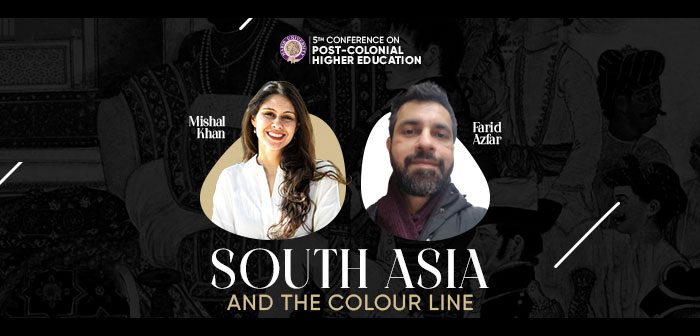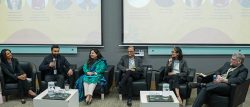The final session of the 5th Post-Colonial Higher Education Conference, Habib University’s flagship conference was held online on March 25. Titled South Asia and The Colour Line, it featured sociologist Mishal Khan, and Associate Professor of History at Swarthmore College, USA. The panel was moderated by Dr. Shama Dossa, Associate Professor in the Social Development and Policy program at Habib University, along with Conference Chair, Dr. Nauman Naqvi, Associate Professor in the Comparative Humanities program at Habib University.
Khan began her lecture by sharing her reflections on what she believes South Asia has to offer to urgent debates about racial capitalism and its history. She brought into focus W. E. B Du Bois’s famous formulation in his essay, The Dawn of Freedom, where he says, “the problem of the 20th century is the problem of the Colour Line.”
She stated that Du Bois was clear in admitting that the colour line was not just the division between black and white but a global racial ordering, which is the topic of this conference. “In his formulation, the European empire and capitalism were both inextricably tied together creating a world that locked colonized people into subordinate positions that enabled capitalists and colonizers to draw on their resources and of course, their labour.”
She spoke about the interventions she made her in her research, “Abolition as a Racial Project” that explores what racialization means in the South Asian context. Khan argued that in South Asia and the colonial world in general, we need to focus attention away from the legacies of slavery and more towards the focus on British abolition – this was itself an essential tool used to reorder the world for the purpose of global labour control. She went on to state that this came from the same appreciation that racialization as a global process of modernity began in the Atlantic world and had different contingent consequences in the rest of the world.
Through a graph, she showed how the sorting of racial categories was crucial to processes of global racial capitalism, particularly to establishing India as a site of free labour. She established that slavery cases always involved Africans or Shidis. The Shidi community was the “residue behind questions of slavery.”
Race, caste, kinship, she pointed out, are all terms that we impose on a complicated social reality that involves many distinct kinds of legacy, including slave legacy. Khan concluded by stating, “Whiteness and whether or not we think about different formulations of social hierarchy in South Asia look like whiteness but are not quite that.”
Farid Azfar’s presentation was titled, ‘Turtle Hunters: Capitalist War in Colonial Karachi’ that displayed a print without a context called Graphic in 1880. This was a series of four panels as a kind of satirical parable to turtle hunting that served as a kind of colonial governance.
Azfar suggested through this print that along with being a satirical parable, it also displayed colonial abjection of whiteness and a state of rapturing: “it was a story of a group of people possessed by a power produced for them by highly fortuitous historical conditionings, reflecting a subliminal subconsciousness of the fact that they were once luckier and more capable than their own colonial forebearers.”
He stated that the point of restructuring this history was not just to blame the West for everything but it was to retrace the role of human agency in constructing the problem so that the steps to reverse the problem can at least be imagined, if not affected.
“The capitalist war,” Azfar went on to say, “that is staged on and waged upon the archipelagic, shapeshifting, politically recalcitrant trading zone that was Karachi depends on the pre-existing energies of a city that has long combined the elements of smuggling den and pirate’s nest.” He concluded by leaving us to ponder on the reparation of the future in terms of race, “even today, as beset as Karachi is with crisis, the utterly exceptional place that kind of springs from these works can also be a battleground for reimagining the future of racial capitalist regime.”
As the seminal intellectual conference ended, opening dialogue and contemplation on whiteness in South Asia, each panel left us with much to ponder over given our postcolonial racial realities. The Conference Chair, Dr. Nauman Naqvi, thanked the speakers for their participation and efforts while reminding us why this topic was important to talk about, “it is especially important to the entire modern period. The way that South Asians have repressed the whole racial aspect and created racial attitudes has to do with our own oppression.”
The racialized order served to simultaneously reduce human beings to a biological reality that does not correspond to either their nature or to the nature of reality itself. Acknowledging Habib University’s pedagogical vision and mission to further the reparative project of reimagining and reconstructing a hopeful future, Dr. Naqvi stated, “Habib’s mission is central to the work of this project. This de-racialization is linked to the process of hooking up with our inheritances and legacies.”




